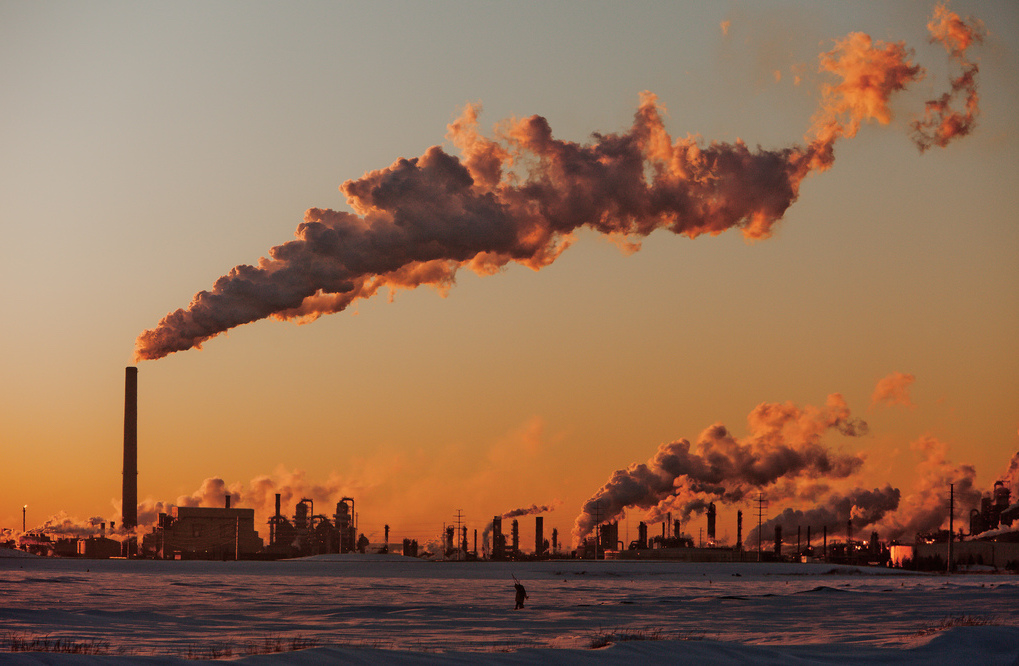Almost completely forgotten amid the brouhaha yesterday about Alberta’s response to the B.C. government’s plan to restrict the flow of diluted bitumen through its territory was the new report from the Parkland Institute that shows none of Canada’s Big Five tarsands producers have even set targets to bring their emissions in line with the 2015 Paris Climate Agreement that Canada’s federal government has signed on to.
Well, timing is everything in news, and there was no way the researchers at the University of Alberta-based research institute could have known a sensational internecine Pipeline War was going to break out yesterday along the Rocky Mountain Cordillera between the social democratic governments B.C. and Alberta. Parkland and the Corporate Mapping Project went ahead anyway and released What the Paris Agreement Means for Alberta’s Oil Sands Majors with its dire analysis of “the social cost of carbon.”
The report’s conclusion that the five giant oilsands companies are causing as much as $2 trillion in pollution is probably more significant for Alberta in the long run than the political posturing yesterday by the NDP governments of B.C. Premier John Horgan and Alberta Premier Rachel Notley.
The report by researchers Ian Hussey and David W. Janzen argued this means the Big Five — CNRL, Suncor Energy, Cenovus Energy, Imperial Oil, and Husky Energy — are significantly overvalued because of their “carbon liabilities,” which the researchers defined as “an estimate of the social and environmental costs of carbon emissions embedded in fossil fuel reserves.”
“Even under the most conservative carbon cost scenario used in the report, the carbon liabilities contained in the reserves of the Big Five outweigh the total value of the corporations themselves, and taken together are greater than the GDP of Alberta,” said Hussey, the report’s lead author.
“The enormous cost associated with these reserves being combusted underscores the simple reality that business as usual is not an option for these companies,” he added. “Unfortunately, we’re not seeing that reality reflected in their actions to date.”
It needs to be noted that the problem of the social cost of carbon that is eventually going to have to be paid by someone is not exactly news to either environmentalists or the oil industry. But trying to put a number to it — even if it’s one that’s too big for normal mortals to grasp — is important work.
All of the Big Five except Imperial Oil have acknowledged the Paris Agreement, Hussey noted. But not one has set targets or implemented material action in line with emissions reductions required to limit global temperature increase to 2 degrees Celsius. “On the contrary, all five corporations project increases in their total emissions for years to come.”
Hussey argued that “if all of the Big Five’s reserves are ultimately burned, the billions of dollars in carbon liabilities will be paid by the public and governments through the cost of dealing with extreme weather events, climate change mitigation, and health impacts.”
He concluded: “If some of these costs are instead reflected accurately in the bottom lines of these corporations, we’ll start to see the kind of responses from the Big Five — which has to include leaving some of their reserves in the ground — that the reality of climate change demands.”
Right now — in Alberta generally and in oil industry circles — the idea of leaving reserves in the ground is viewed as pure insanity. Mark my words, though, smart legal strategists in Canada and the United States are hard at work developing ways to hold fossil fuel companies liable for the costs of the environmental damage they are imposing on communities and countries around the world.
As the report says, “most of the profits accrued by the Big Five and their shareholders, who are mostly not Canadians (as of July 2017), are ‘paid’ by the public and the environment through coastal damage, extreme weather events, decreased food production, and negative health effects.”
Shareholders and some governments may view this as crazy talk right now — just as Big Tobacco once did — but this message is bound to be brought home eventually to large fossil fuel companies that profit to the tune of hundreds of billions of dollars while lobbying to slow down responses to climate change, to which they are contributing.
And work like that done in yesterday’s Parkland report helps frame the social costs of carbon in terms that are meaningful to ordinary Canadians — including pipeline advocates from Alberta and pipeline enemies in B.C. alike, presumably.
I don’t know if it worries other Albertans that the report’s lowest estimate of the five companies’ total carbon liabilities, calculated at $50 per tonne, is $320 billion, higher than Alberta’s total gross domestic product of $309 billion, but, by God, it should. The high estimate of nearly $2 trillion was reached by calculating the liabilities at $200 per tonne.
What the Paris Agreement Means for Alberta’s Oil Sands Majors calls on fossil fuel corporation shareholders and governments to demand increased transparency from the Big Five. This should start with public disclosure of how they model their emissions and creation and disclosure of robust and science-based emissions-reductions targets that in line with Canada’s international commitments, it says.
For the time being, presumably, the inclination of the industry will be to put beans in its ears and continue to call for growth — abetted by the Alberta government’s friendly emissions cap, which allows dramatic industry growth between now and 2030 despite the fact that would make it impossible for Canada to meet its Paris Agreement commitments.
The Corporate Mapping Project is a six-year research and public engagement initiative jointly led by the University of Victoria, the Canadian Centre for Policy Alternatives B.C. and Saskatchewan Offices and the Parkland Institute. It is supported by the Social Sciences and Humanities Research Council of Canada.
This post also appears on David Climenhaga’s blog, AlbertaPolitics.ca.
Photo: kris krüg/flickr
Like this article? rabble is reader-supported journalism.




